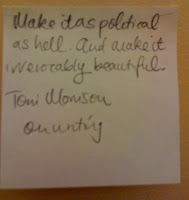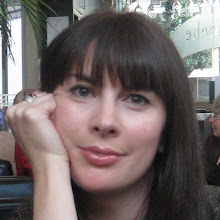Monday, November 23, 2009
what happened to the last two weeks?
Thus, I'm a TAD behind on ye olde Nanowrimo - but I am not disheartened. I've written another 2000 words today on *the book* and will just keep on at it throughout the summer. Come February, I will be revising the first draft. That's a promise.
Tuesday, November 10, 2009
losing my momentum . . . and finding it again

 marriage ceremony, both Paris and the shtetl in the background. My book must do this too - show the Adana and London, the past and the future, the dead and the living.
marriage ceremony, both Paris and the shtetl in the background. My book must do this too - show the Adana and London, the past and the future, the dead and the living. Tuesday, November 3, 2009
further updates on THE BOOK, including an imagined conversation with Toni Morrison
Sunday, November 1, 2009
NanNoWriMo: otherwise known as insanity
So these biscuits evoke for me a multitude of meanings: on one simple level they are the taste of Christmas to my family, a flavour that reminds us all of the warm kitchen and the large tree, my mother rolling out the dough and chilling it before shaping the pears with their clove stalks. On another – the story of Mrs Kassardjian who embraced my young parents so far from home on their first Christmas as soon-to-be parents, at that liminal moment before my family came into being. And more distant, more resonant – a cultural memory of a way of life I never witnessed, a side by side existence, of cultural pickpocketing, in a part of the world that we now all associate with extreme ethnic divisions. So they bring hope, in a way, that the biscuit can remind us of a hodge podge, a melange, a mongrel culture that drew on all around it, that is called one thing but claimed by another – that we can all be a little more like Mrs Kassardjian, an Armenian refugee making Greek biscuits in London for two New Zealanders who’d never been to Greece or Armenia – but who passed those flavours – almond, cloves – to their children.
I will actually blog about the process, and the loveliness of my husband and children as they live with me through this - maybe tomorrow, maybe the day after. You see, I still have to work; and cook; and do research! Tonight I'm off to share recipes with some of my favourite women . . . . some of theirs may be stolen for THE BOOK. They don't know about the evil thieving ways of writers, as of yet . . . .
Sunday, August 16, 2009
death of a poet, yes. death of a culture? maybe.

Tuesday, July 14, 2009
more controversy at my alma mater
Like David Young, I was at Waikato when the "Kupka Affair" exploded nine years ago, and was actually in the midst of an honours dissertation on Modern Jewish Literature at the time. I knew all the parties involved and was present at most of the protests and meetings. I was not a journalist or unbiased bystander. So you may wish to discount my memories: taking over University Council Meeting in peaceful protest, the room bought to hushed and guilty silence as a Holocaust survivor spoke of the pain caused by being interviewed about being German in New Zealand by a man who publicly denies the historical truth of the Holocaust. Watching my professors weep openly as they discovered that the University, a community they'd been part of for over twenty years, treated them as troublemakers and pariahs for daring to question the validity of the awarding of Kupka's thesis.
I cannot help but see this new controversy in the light of attitudes that emerged at that time. Dr Bing, and others were labelled radical and impartial - as if it is possible to be impartial about the Holocaust - and their opinions were marginalised. To have the Deputy Vice-Chancellor Research - another good man, Doug Sutton - perpetuate the notion that there is a balanced (ie two sided) approach to Holocaust denial - makes a mockery of what Universities stand for. The deniers use the discourse of balance to undermine the historic truth of events in Europe; they use our human discomfort with a period of human history we would rather forget; they use our inability to imagine six million dead to tell us that perhaps they didn't really die.
It is the reponsibility of intellectuals to speak the truth and expose lies: not to provide mealy-mouthed justification for the protection of lies and those who propagate them. To attempt to discount Bing's supervision because of his "long-standing" views against neo-Nazi groups is more than ridiculous - it is obscene. Thanks to people like Dr Dov Bing and Dr Norman Simms , the University of Waikato was a place that encouraged global perspectives, historical analysis with depth and breadth, polyglot understanding of literary contexts, and canonical texts read with twenty-first century eyes. Let's hope they are given the freedom and support to continue to do so.
Thursday, May 28, 2009
auckland: the city I live in



Monday, May 25, 2009
following on from yesterday; a serious discussion about gendered roles
What ruined the panel discussion for me, and for those I was with (see my friend Anya's review) was the way Carole was 'cast' as the spendthrift consumer whose only real contribution to the discussion was a list of Prada bags she has owned . . . now, I like handbags as much as the next girl, and I really like Carole - she's a smart, gorgeous, down to earth woman whose made a great career for herself based on both the smarts and the gorgeousness. BUT I dislike intensely a puported intelligent discussion of the position "I am what I own" denigrating into a trivial female who likes stuff for stuff's sake pitted against five men, including her own husband, who were taking much loftier positions about the importance of stuff. Particularly annoying was the reverence with which the audience and panel treated Bollinger's discourse on music and the art of collecting - compared with the laughter that had greeted Hirschfield's claim to collect Prada handbags. Now, is that a gendered value judgement or what? Stuff men collect (music, computers, countries) is worthy of curating and writing about, while stuff women collect is laughable.
I'm not actually a harpy - this kind of public acceptance of gendered roles irritates me because it reduces human beings to cliches. If Carole was happy to take the role of consumer, that's fine - they needed, however, to include another woman who could take another view point too. And perhaps next time, Finlay and Carole could keep chat about the size of their mortgage to a minimum? We actually wanted more of a conversation that, at times, referenced everything from High Fidelity to Margaret Atwood's Payback, managing to keep a sizable crowd that seemed brimful of the intelligentsia engaged. We like panel discussions; we like Prada handbags; we like to think the two are not mutually exclusive - and most of all, we like to think that there is more than one way to be a woman in the twenty-first century.
Sunday, May 24, 2009
very very trivial things (and some of import)

 but the rest of the beautiful garments were the sort of thing I always think I'd like to wear when I'm old. Which I am not, yet.
but the rest of the beautiful garments were the sort of thing I always think I'd like to wear when I'm old. Which I am not, yet. Wednesday, May 20, 2009
strange things are afoot at the circle k
Wednesday, March 11, 2009
thoughts on John Key, especially now the blogosphere's a-twitter with his WSJ appearance
Three recent American studies suggest that this myth is just that – a myth. Despite much of the neo-conservative rhetoric about Barack Obama being based on his so-called ‘elitism’, which is shorthand for being too well spoken and over-educated, the studies, one of which has been recently published in PS: Political Science and Politics, the Journal of the American Political Science Association, draw similar conclusions: that the politics of academics have little or no impact on those of their students, even in political science departments. It seems that other old myth – peer pressure is to blame. Professor April Kelly-Woessner (a liberal Democrat) and her husband, Professor Matthew Woessner (a conservative Republican) found that while students do tend to move towards left-wing politics while at university, this is largely because of the influence of their peers and what was going on outside the classroom.
What was going on outside the classroom? Well, in the last six years, there’s been an unjustifiable war and a consciously anti-elitist president. Before that, in the nineties, there was another war, and another neo-con, slightly more elitist president. And overarching all of that has been the ‘culture wars’, from whence the basis for these studies originates. Since the late 1980s, conservative thinkers and think tanks have tended towards a position that equates education with liberalism, wishy-washy thinking and weasel words. Thus fell the legacy of conservative intellectuals such as William F Buckley and Daniel Patrick Moynihan, whose contributions to American society were once necessary reading for anyone at all interested in the United States, particularly US foreign policy. Since the ascendancy of Bushes senior and junior, conservatism has become synonymous with anti-intellectualism, in part because of the perceived influence of radical professors on the politics of right-thinking Americans. Whole conservative colleges had to be established to protect the little darlings against having their prejudices challenged.
All that has now changed: the election of consciously intellectual and well-spoken Barack Obama, and the serendipitous release of these studies, suggests that perhaps intellectuals may be in for some better press. Obama’s embrace of the education that made him who he is today, like his unashamed embracing of the less than PR perfect influences in his life – Rev. Jeremiah Wright, his grandmother – suggests that we might be able to talk now about education now outside the premises of the culture wars, and instead talk about what exposure to ideas can do for a young mind.
Which brings us to New Zealand. We’ve gone the other way – having failed to re-elect a consciously intellectual woman and her academic economist deputy – we’re now depending on an ‘aw shucks’ businessman and a Southland farmer who likes to downplay his own intellect to manage us out of a worldwide crisis. John Key is a very intelligent man – but he likes us to forget that, because New Zealanders seem stuck in the midst of the culture wars, perpetually informed by that old chestnut that those who can do, and those that can’t teach. Obama’s election has reconfigured the traditional discourse of power – and has relocated presidentiality in the person of a black man, a community organiser, a reconciler. Let’s hope that in New Zealand we can similarly relocate intellect into the discourses of power – and embrace leaders who are not ashamed to talk of things other than imports and short-selling.

